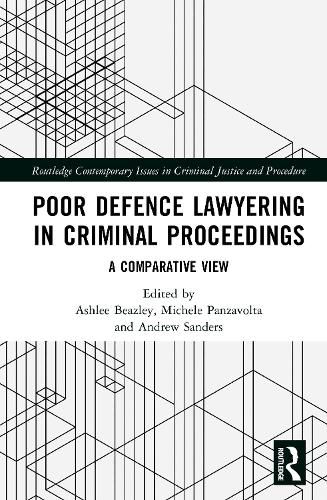Readings Newsletter
Become a Readings Member to make your shopping experience even easier.
Sign in or sign up for free!
You’re not far away from qualifying for FREE standard shipping within Australia
You’ve qualified for FREE standard shipping within Australia
The cart is loading…






This collection discusses the concept of 'poor quality' criminal defence representation and assistance, so-termed poor lawyering. It does so from diverse perspectives, including legal and criminological. The work presents an overview of the issue of the quality of legal assistance in criminal proceedings, so allowing a better understanding of the potential limits and problems. The volume is divided into three parts which, over 14 chapters, offer analyses of poor lawyering across national and supranational legal systems, including Belgium, Germany, Greece, Italy, England and Wales, the United States, and the European Court of Human Rights; the specific challenges of poor lawyering, such as regulation of counsel before the International Criminal Court, through codes of conduct, and in cross-border proceedings within Europe; the individual fault and external pressures of criminal defence lawyers; the 'missed opportunity' of pre-charge engagement; the importance of insights from legal and criminological psychology; and the role of neurodivergent defendants in the adaptation of the defence lawyer's assistance. The collection concludes with a transversal and comparative analysis of the effectiveness of defence and the independence of lawyers. With contributions from academics and practitioners from a range of backgrounds, the book will be a valuable resource for students, academics, researchers, and policymakers working in the area of criminal justice.
$9.00 standard shipping within Australia
FREE standard shipping within Australia for orders over $100.00
Express & International shipping calculated at checkout
This collection discusses the concept of 'poor quality' criminal defence representation and assistance, so-termed poor lawyering. It does so from diverse perspectives, including legal and criminological. The work presents an overview of the issue of the quality of legal assistance in criminal proceedings, so allowing a better understanding of the potential limits and problems. The volume is divided into three parts which, over 14 chapters, offer analyses of poor lawyering across national and supranational legal systems, including Belgium, Germany, Greece, Italy, England and Wales, the United States, and the European Court of Human Rights; the specific challenges of poor lawyering, such as regulation of counsel before the International Criminal Court, through codes of conduct, and in cross-border proceedings within Europe; the individual fault and external pressures of criminal defence lawyers; the 'missed opportunity' of pre-charge engagement; the importance of insights from legal and criminological psychology; and the role of neurodivergent defendants in the adaptation of the defence lawyer's assistance. The collection concludes with a transversal and comparative analysis of the effectiveness of defence and the independence of lawyers. With contributions from academics and practitioners from a range of backgrounds, the book will be a valuable resource for students, academics, researchers, and policymakers working in the area of criminal justice.